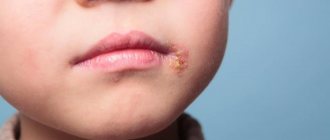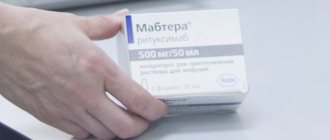From this article you will learn:
- what does Acyclovir help with?
- instructions for use of acyclovir (in children and adults),
- what analogues are there?
- tablets, ointment or cream acyclovir – price 2022.
Acyclovir is the first specific antiviral drug, which since 1981 has been widely used in the treatment of herpes simplex virus (types HSV-1, HSV-2), as well as herpes zoster and chickenpox. Type of virus HSV-1 - causes herpes on the lips, facial skin and oral mucosa. The HSV-2 virus type is predominantly genital herpes only, but in 10% of patients it can also cause both herpetic stomatitis and herpes labialis.
Acyclovir has a rather weak effect on other representatives of the herpevirus family (Epstein-Barr virus, cytomegalovirus). The drug is very well tolerated by children, even the youngest, and can also be used during pregnancy. Acyclovir cream or ointment is intended for external use and is available without a prescription, but Acyclovir tablets or vials for intravenous administration should be used only as prescribed by a doctor!
Acyclovir: photos of several release options
Composition and release form –
- cream for external use 5%,
- ointment for external use 5%,
- eye ointment 3%,
- Acyclovir tablets 200 and 400 mg,
- in bottles for preparing a solution (200 mg, 250 mg, 500 mg or 1 g).
Acyclovir analogues of the drug - the original drugs of acyclovir are drugs from the Zovirax line - from (Great Britain). All drugs containing acyclovir from other manufacturers are only generics, for example, Acyclovir-Akrikhin (Russia), Acyclovir-Sandoz (Switzerland), Acyclovir-Hexal (Germany), Acyclovir-Belupo (Croatia), as well as many others. And although manufacturers of generic drugs say that their drugs are no less effective, most doctors believe that generic drugs are still inferior to original drugs in terms of such criteria as effectiveness and safety. At the end of the article, you can also read about modern analogues of acyclovir - the antiviral drugs Famciclovir, Valacyclovir and Penciclovir.
Important: the original acyclovir under the Zovirax brand in tablets can be taken from 0 years of age. At the same time, the instructions for the Russian drug “Acyclovir-Akrikhin” indicate that children under 2 years of age are a contraindication. The same applies to the use of Acyclovir tablets during breastfeeding (Zovirax is allowed with caution, but for the Russian analogue this would be a contraindication).
What is acyclovir?
Acyclovir is a selective, antiviral drug, a nucleoside analogue, related to cytarabine, idoxuridine, trifluridine and vidarabine, active against 4 types of herpes virus (herpes simplex types 1 and 2, chickenpox (type 3), cytomegalovirus (type 4)). It slows down the growth and spread of the herpes virus in the body by affecting their viral cells at the DNA level. This drug does not completely cure herpes, but it reduces the symptoms of the infection and its acute course.
Acyclovir is used both for therapeutic treatment and for the prevention of relapses. It effectively eliminates skin rashes and foci of inflammation around it, prevents the spread of the viral pathogen (contamination), and reduces the complications of herpes.
The effect of acyclovir therapy is greatest when treatment is started early, especially for non-primary infections, which usually have a shorter course than the primary episode. Long-term prophylactic oral acyclovir in patients with frequent episodes of genital herpes simplex completely suppresses relapses in most patients; As with other acyclovir-responsive infections, the viral latency period is not eradicated and the pre-treatment relapse rate returns after treatment is stopped.
Caution should be exercised when using acyclovir prophylactically in the general population due to the theoretical risk of the emergence of viral strains that are resistant to acyclovir and other agents whose mechanism of action is dependent on viral thymidine kinase (viral protein).
Intravenous acyclovir is the drug of choice for biopsy-proven herpetic encephalitis (damage to the nervous system by herpes) in adults, and has also been successfully used in the treatment of disseminated herpes simplex in pregnant women and herpes in newborns. Intravenous and oral acyclovir protects against the spread and progression of varicella zoster virus infection, but does not protect against postherpetic neuralgia (a complication of herpes zoster, manifested by the appearance of serous rashes in the area of innervation of individual branches of the trigeminal nerve).
In immunocompromised patients, intravenous, oral, and topical acyclovir reduces the clinical course of herpes simplex infections, while prophylaxis with oral or intravenous dosage forms suppresses reactivation (recurrence) of the infection while taking the drug.
Ophthalmic use of 3% acyclovir ointment quickly cures herpetic corneal ulcers and superficial herpetic keratitis. Thus, despite its failure to eradicate latent virus, acyclovir, administered therapeutically or prophylactically, is now standard antiviral therapy for some manifestations of herpes simplex virus infection and does represent a major advance in this regard.
The mechanism of action of the drug Acyclovir. Pharmacokinetics and pharmacodynamics
Acyclovir, entering the body of a person infected with herpes, is absorbed and ends up in the bloodstream. Here it recognizes infected cells and, under the influence of an enzyme secreted by the virus, is converted into a salt - triphosphate. This is the active form of Acyclovir.
Being an analogue of thymidine, a natural component of DNA, it penetrates the cell with the “enemy” and takes the place of one of the latter’s components. But without it, the virus will not be able to complete the construction of its DNA. It subsequently turns out to be defective, the process of pathogen reproduction is disrupted.
There is no need to be afraid that the drug will damage the DNA of a person suffering from the virus. Acyclovir is a highly selective medicine. It interacts only with viral DNA.
As a result of the fight against herpes Acyclovir:
- prevents the appearance of new bubbles;
- reduces the risk of spreading infection on the skin and internal organs;
- accelerates the process of crust formation;
- reduces the severity of pain from herpes zoster.
The drug also stimulates immune processes.
Acyclovir is absorbed in the intestine (partially). The ability of the drug to be absorbed is low. Only about 15-20% reaches the site of its action. Such a pharmacokinetic parameter as the percentage of protein binding is 9-33%. This connection is considered low. There is more free fraction of the drug, which means there are more active molecules that can work with the DNA of the virus.
About half of the total concentration of Acyclovir in blood plasma is found in the cerebrospinal fluid. The drug, when taken orally and parenterally, also penetrates well into the brain, kidneys, liver, lungs, tear fluid, uterus and other organs, fluids, as well as the contents of herpetic vesicles.
Acyclovir molecules are converted in the liver into inactive metabolites. However, cytochrome P450 enzymes are not involved in this process.
The drug is excreted primarily by the kidneys. Moreover, some of the Acyclovir molecules leave the human body unchanged.
The half-life of the drug from the body is 2-3 hours. Therefore, it is recommended to administer it intravenously at intervals of 8 hours.
Symptoms of acyclovir overdose
You should stop taking acyclovir if you experience these symptoms:
- easy bruising or bleeding, purple or red dotted spots under the skin;
- changes in behavior (motor restlessness and emotional agitation, confusion, hallucinations);
- disorders of the urinary system (anuria (lack of urination), painful or difficult urination), swelling of the lower extremities;
- feeling tired, shortness of breath.
Uncomplicated side effects of acyclovir include:
- skin allergic manifestations (itching, soreness of the skin when touched, rashes);
- nausea, which may be accompanied by vomiting, stomach upset (diarrhea);
- headaches and/or dizziness;
- pain in the mouth when taking acyclovir tablets buccally (by the cheek).
Typically, cases of acyclovir overdose have been recorded extremely rarely, but common manifestations are allergic reactions, which entail a number of symptoms:
- hives, blisters, itching;
- difficulty breathing and swallowing;
- swelling of the face, throat, tongue, lips, eyes, hands, feet, ankles, or legs;
- hoarseness;
- cardiopalmus;
- general weakness;
- pale skin;
- confusion and/or loss of consciousness;
- the appearance of unusual bruises on the body;
- blood in urine and stool;
- numbness, burning or tingling in the upper and lower extremities;
- temporary inability to move parts of the body.
If you experience any of the above symptoms, you should contact your doctor immediately.
What you need to know before you start taking acyclovir
You should not take this medication if you are allergic to acyclovir or valacyclovir (Valtrex). The use of Sitavig buccal tablets is not recommended if you have an allergic reaction to milk proteins.
To make sure this medication is safe for you, check with your doctor before taking it if you have a history of the following conditions:
- kidney disease;
- weakened immunity (as a result of taking some medications or caused by any disease).
It is especially important to consult a specialist if you are pregnant or planning a pregnancy, or if you are breastfeeding a child. Because herpes can be passed on to your baby during birth if you develop genital lesions at birth. If you have genital herpes, it is very important to prevent herpes during pregnancy.
During lactation, this medication may be unsafe. You should consult with your doctor to identify and determine any possible risks to your newborn baby.
Acyclovir can be used in children from 2 years of age.
Acyclovir on the list of essential drugs
In Russia, as in many other countries of the world, this medicine is included in the list of vital and essential drugs (VED).
After all, this is the most accessible, safe and, in most cases, effective remedy for the treatment of viral diseases. Herpes is an infection that manifests itself not only externally in the form of rashes and causes psychological discomfort. Diseases that arise as a result of infection or activation of at least one type of this virus already existing in the body are life-threatening. A herpetic infection also means severe itching, pain, injuries to the skin and mucous membranes, damage to internal organs, etc.
But the most severe manifestations and consequences of this viral disease include:
- postherpetic neuralgia (pain that occurs as a result of improper therapy or its complete absence, lasting from several months to several years, and in more serious cases, a lifetime);
- herpetic pneumonia (pneumonia, which is difficult to treat);
- meningoencephalitis (serious damage to the brain and its membranes, leading to seizures, coma and even death);
- gastrointestinal lesions (poor digestion, internal bleeding);
- herpetic lesions of the genital organs in a woman (one of the causes of infertility, miscarriage);
- tissue necrosis due to the appearance of large areas of rashes and the formation of large conglomerates.
This is just a small list of diseases and conditions that can result from the lack of etiological and pathogenetic treatment of herpes. That is why it is so important that Acyclovir, as the first assistant in the fight against this disease, is always available to doctors and their patients.
The state understands the importance of the problem of treating herpes, therefore it controls the price of the drug by including it in the list of vital and essential drugs. In order for Acyclovir to be available at any pharmacy due to its importance, the Ministry of Health of the Russian Federation added it to the list of minimum assortment. Pharmaceutical organizations cannot refuse to purchase this drug.
How to take acyclovir?
You must take acyclovir exactly as indicated in the instructions or as individually prescribed by your doctor. Do not use the drug in doses that do not comply with the instructions and do not exceed the permissible duration of use.
To use this medication in children, be sure to consult a doctor and carefully study the official instructions for the drug.
To use buccal acyclovir, do not crush, chew, suck, or swallow the tablet; simply place the flat side of the tablet on the herpes-affected area.
Note!
Giving buccal tablets to children is strictly prohibited, as this can lead to suffocation.
If you take acyclovir in the form of a suspension, be sure to use a special dosing measuring cup to measure the dosage. It is not recommended to use ordinary cutlery (a kitchen spoon) for this purpose.
The calculation of the dose of acyclovir used depends on the weight category (especially important for children). When losing or gaining body weight, the dose may vary.
During treatment with acyclovir, it is important to drink as much fluid (drinking water) as possible to maintain normal kidney function.
When prescribed a course of treatment with this drug, it is necessary to strictly follow it, even if your symptoms improve after the first days of using acyclovir, since interrupting treatment or skipping doses may increase the risk that the virus will become resistant to acyclovir, and there is also a high likelihood of frequent relapses.
The drug should be stored out of the reach of children, away from moisture and heat.
Purchasing Acyclovir at a pharmacy. Home storage
The drug in the form of tablets, suspension, lyophilisate must be prescribed exclusively by a doctor and is dispensed from a pharmacy upon presentation of a prescription. External lekforms are freely available.
Storage conditions for Acyclovir-based drugs vary depending on the manufacturer. The vast majority can be left in the closet at home. However, there are exceptions, for example, 5% Acyclovir ointment from Sintez OJSC (Kurgan, Russia). This medication should be stored in the refrigerator. Do not put external preparations with the above-mentioned active ingredient in the freezer.
Consequences of an overdose of acyclovir
Cases of overdose with acyclovir have not been recorded, but if a dose of acyclovir is taken too high, the following symptoms may occur:
- nausea, vomiting, diarrhea;
- headache, dizziness, clouding of consciousness;
- dyspnea;
- anaphylaxis (immediate allergic reaction);
- febrile symptom (increased body temperature);
- swelling;
- visual impairment;
- general malaise;
- myalgia (muscle pain).
If you have taken a high dose of acyclovir and experience any of the above symptoms, you should seek emergency medical help as soon as possible.
What should you not do while taking acyclovir?
When using buccal acyclovir until it is completely dissolved in the mouth, you should avoid brushing your teeth, chewing gum, and wearing dentures. You can rinse your mouth with caution. It is recommended to drink plenty of water to prevent dry mouth.
It is worth remembering that herpes infections are contagious, even if you are treated with acyclovir you can still infect other people, so avoid contact of infected areas with other people. When touching the infected area, do not touch the mucous membranes of the eyes with your hands. Wash your hands with soap as often as possible to prevent the spread of infection.
With genital herpes, even during treatment with acyclovir, the risk of infecting a sexual partner does not decrease. It may still be contagious even if you don't have any symptoms.
What are the side effects of acyclovir?
Common side effects after taking acyclovir may include:
- headaches and dizziness;
- pain in the gastrointestinal tract, feeling of nausea;
- hives (itchy skin with large red rashes);
- fast fatiguability.
If you observe the following symptoms, you should contact an ambulance as soon as possible:
- skin hemorrhages on the body;
- vomit;
- problems with urination;
- behavioral changes;
- pain in the mouth when using the buccal form of acyclovir.
Directions for use and dosage of acyclovir
For the treatment of herpes virus types 1 and 2:
Adults: 1 tablet at a dose of 200 mg 5 times a day with an interval of 4 hours between doses. The course of treatment lasts up to 10 days on average.
The maximum dose taken per day is 1000 mg (5 tablets).
Children: used for children from 3 years of age: from 3-6 years - 400 mg (2 tablets) per day.
For children from 6 years of age, it is used in the same dosage as for adults. The course of treatment is determined by the doctor. On average, it is used up to 5 days.
For the treatment of herpes virus types 3 and 4:
Adults: prescribed at a dose of 800 mg up to 5 times a day (dosing interval 4 hours). The duration of treatment is determined by the doctor, but on average the course is about 10 days.
Children: from 3 to 6 years, 400 mg (2 tablets) 4 times a day.
Children over 6 years of age are prescribed in the same dosage as for adults.
In old age, the process of removing the drug from the body (clearance) slows down, so it is necessary to take care of drinking plenty of fluids during treatment with acyclovir, and if renal function is impaired, the dose of the drug should be reduced.
It is worth remembering that for each person, based on the state of health and the specific type of herpes virus, the dose may vary, so acyclovir should be prescribed by a doctor.
History of the creation of Acyclovir, interesting facts
The drug was synthesized in the early 70s of the last century by an employee of the laboratory of one of the largest pharmaceutical companies today - GlaxoSmithKline (although it was called differently then). The name of this discoverer of Acyclovir is Howard Schaeffer .
However, the world learned about entering a new era in the treatment of viral diseases from another employee of the same laboratory - Miss G. Elion . This intelligent and courageous woman received the Nobel Prize in Physiology or Medicine in 1988 . However, by education she was neither a doctor nor a physiologist. But this woman scientist realized her desire to help people in the fight against disease after the death of her grandfather from cancer, which she told the public about in her Nobel speech.
The synthesis of Acyclovir was preceded by the preparation of 2,6-diaminopurine. This substance did not live up to expectations, as it turned out to be toxic to humans. However, the creators of Acyclovir continued to synthesize diaminopurine derivatives. And, oh, Eureka, acycloguanosine has shown high effectiveness. However, this derivative was not toxic in comparison with its progenitor. This substance was later named Acyclovir.
To synthesize Acyclovir, it was necessary to obtain nucleosides. For this purpose, a Caribbean sponge living in the sea of the same name was used. So, in part, Acyclovir can be considered a medicine of natural origin. Nucleosides have also been obtained from Tectitethya Crypta to create an anticancer drug.
For several years the new medicine was kept secret. It was not until 1982 that the drug was approved by the Food and Drug Administration in the United States and marketed under the trade name Zovirax.
Interaction of acyclovir with other drugs and substances
If you are using medications to treat tumors, osteoporosis (low bone density), gastrointestinal disorders, or rheumatoid diseases, then taking them together with acyclovir may increase the negative effect on the kidneys (nephrotoxicity). Therefore, you should be careful and when using any medications, you should consult your doctor.
Be careful!
When taking acyclovir simultaneously with Probenecid (a drug for gout), the half-life of acyclovir increases and its biotransformation (redistribution in the body) decreases. This is especially important for those who have impaired kidney function.
This is not an exhaustive list of drugs that may interact with acyclovir. You should tell your doctor about any medications you start or stop using.
Contraindications
The drug has no absolute contraindications. However, you should prescribe and use Acyclovir with caution when:
- pregnancy;
- breastfeeding;
- kidney disorders;
- reaching old age;
- severe dehydration due to taking large doses of the drug;
- history of neurological disorders or reactions to the use of cytotoxic drugs.
Each dosage form has its own age-related contraindications. For example, it is not recommended to prescribe tablets to children under three years of age due to the fact that they will not be able to swallow them and will choke. Ointments and creams based on Acyclovir are not applied to children under 2 years of age, as they can lick off the medicine, wipe it off, and also because the permeability of the skin at such a tender age is increased, which means systemic effects are possible.
Photo: https://pixabay.com/photos/pregnant-mother-body-pregnant-woman-1245703/
What you need to know about acyclovir
Do not forget that acyclovir, like all other medications, must be stored out of the reach of children. Never share your medications with other people, so as not to harm their health. Remember that acyclovir should be used only for its intended purpose.
Always consult your doctor to make sure the information on this page applies to your individual situation.
Sources
Acyclovir / Drugs.com (English)
Acyclovir / State register of medicinal products (ukr.)
apteka24.ua provides comprehensive and reliable information on issues of medicine, health and well-being, however, diagnosis and choice of treatment methods can only be made by your attending physician! Self-medication may be unsafe for your health. apteka24.ua is not responsible for possible negative consequences arising from the use by users of apteka24.ua of the information posted on the site.




